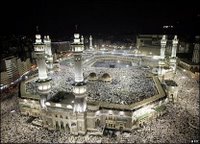 Performing pilgrimage or Hajj is the fifth pillar of Islam and the most significant manifestation of Islamic faith and unity.
Performing pilgrimage or Hajj is the fifth pillar of Islam and the most significant manifestation of Islamic faith and unity.Allah swt says:
And proclaim to mankind the Hajj. They will come to you on foot and on every lean camel, they will come from every deep and distant mountain highway. [Qur’an 22:27]
Undertaking the Hajj at least once in the life time is a duty for all Muslims who are physically and financially able to make the journey to Makkah. The emphasis on financial ability is meant to ensure that a Muslim takes care of his family first. The requirement that a Muslim be healthy and physically capable of undertaking the pilgrimage is intended to exempt those who cannot endure the rigors of extended travel.
Allah says:
Pilgrimage thereto is a duty men owe to Allah, those who can afford the journey; but if any deny faith, Allah stands not in need of any of his creatures. [Qur’an 3: 97]
The pilgrimage is the religious high point of a Muslim's life and an event that every Muslim dreams of undertaking. Umrah, the small pilgrimage, can be undertaken at any time of the year; Hajj, however, is performed during a five-day period from the ninth through the thirteenth of Dzulhijjah, the twelfth month of the Muslim Hijriah calendar.
Performing the Hajj is the spiritual apex of a Muslim's life, one that provides a clear understanding of his relationship with God and his place on Earth. It imparts in a Muslim not only the assurance that he has performed the fifth pillar of Islam by following in the footsteps of Prophet Muhammad[pbuh] originated from Ibrahim and Prophet Isma'il[pbut] but also the realization of an ummah [nation] that is more than one billion strong and spreads across the globe.
A Muslim does not earn “Hajj Mabrur” [acceptable pilgrimage] except by leaving all sins behind him or her. While falling into sin is prohibited at all times, Allah swt gives a specific order to the pilgrims to leave sins.
Allah says:
Hajj is [during] well-known months, so whoever has made hajj obligatory upon himself therein [by entering the state of ihram], there is [to be for him] no sexual relations and no disobedience and no disputing during hajj. [Qur’an2:197]
This verse emphasizes the nobility of the time and greatness of the place.
Allah also says:
Whoever intends [a deed] therein [i.e. in the Haram] of deviation [in religion] or wrongdoing – We will make him taste of a painful punishment. [Qur’an 22:25]
Pilgrimage makes people realize their many evil deeds and mistakes, which are the results of weak fear of Allah and ignoring the Shari`ah [God's commands and Sunnah].
So, what are the wisdoms and aims of the Hajj? One of it's goal is the realization of “taqwa” [piety, fearful awareness of Allah, as Allah says:And complete the Hajj and Umrah for Allah…And fear Allah [Qur'an 2:196]
1 comment:
Hi, I Think this website needs to have a bit more detail about it all and don't use such adult language!
Post a Comment